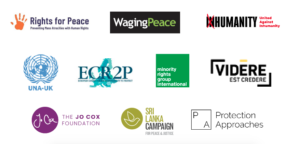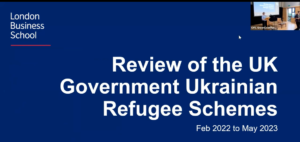Sara Palacios Arapiles is a member of the committee of UAI in the UK. She is a Spanish lawyer and, as a Doctoral Researcher in the School of Law at the University of Nottingham, has written extensively about refugee issues.
The following is a transcript of the response made, at the 2021 AGM of UAI in the UK, to the keynote presentation by Dr Jeff Crisp, entitled ‘Institutionalizing Inhumanity’
I would like to share with you another example of what I believe contributes to “institutionalising inhumanity”. This relates to current bilateral and multilateral deals with Rwanda whereby refugees and asylum-seekers are transferred there, far from Europe, often unwillingly.
To my knowledge, these deals started back in 2014, between Rwanda and Israel. Reports of that time revealed that these two countries signed a private memorandum of understanding whereby Eritrean asylum-seekers in Israel were forcibly removed to Rwanda on tourist visas. According to UNHCR, bilateral transfer agreements must be public and ensure protection against refoulement from the receiving country. I gathered evidence from refugees who were subject to these removals to Rwanda that showcased that neither Rwanda, nor Israel, complied with their international obligations towards refugees.
The tourist visas that allowed entry into Rwanda were obviously temporary; reportedly, refugees were obliged to pay bribes to migration officials upon arrival to be able to enter the country, and once in the country, they did not get access to international protection. After the publication of several reports and advocacy work, these transfers were challenged as contrary to international law, and eventually halted.
However, these transfer agreements have now become “legal”, or in other words, ‘institutionalised’. In 2019, there was a Joint Statement between the Government of Rwanda, UNHCR and the African Union, with the support of the EU, to set up a transit mechanism for evacuating refugees out of Libya. While initially EU Member States were the ones agreeing to receive and provide protection to refugees and asylum-seekers who were held in detention centres in Libya, they later decided to partner with the Government of Rwanda for refugees to be evacuated out of Libya and transferred there instead. Most recently, just a few months ago, Denmark and Rwanda signed a memorandum on asylum and migration, setting out plans to shift asylum procedures outside the EU, and the UK is recently reported to be having similar discussions with Rwanda.
Are these policies and deals in compliance with international law? To what extent can Rwanda ensure the protection of all these refugees? Is there transparency in the management of these transfer mechanisms and the funds that Rwanda has received from its partners? These are urgent questions to which answers from UNHCR can reasonably be requested.
30 June 2021










